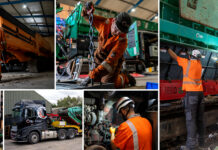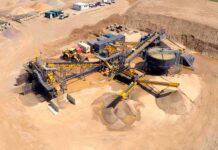
STEVEN Mulholland was recently elected to the role of chairman of the Construction Plant-hire Association (CPA). The founder of West Calder-based Mulholland Plant Services succeeded Steve Cormack of Nationwide Platforms at the organisation’s AGM.
Steven told Project Plant about what he hopes to achieve during his time as chairman, the importance of a co-ordinated approach to attracting fresh talent into the sector to alleviate skills gaps, and why it’s probably not a good idea to keep a bottle of something in the same case as your suit whilst travelling to an important meeting…
Q) HOW DID YOU FIRST BREAK INTO THE PLANT INDUSTRY?
A) As a 15-year-old I spent two weeks on work experience from school with Vibroplant (now Vp PLC), after which I got offered an apprenticeship. I spent almost ten years there, going from workshop to service office to hire desk to sales to depot management.
Q) WHAT’S THE HISTORY OF MULHOLLAND PLANT SERVICES?
A) We started trading in 1999. A family non-operated plant and air compressor hire business, we now employ over 30 staff covering throughout the UK. We have trained most of our own staff, many of whom have come from school or other business sectors in the fine art of construction plant hire!
This has helped us to maintain the same levels of service throughout the business which we were able to offer from day one.
Q) WHAT DO YOU HOPE TO ACHIEVE DURING YOUR SPELL AS CHAIRMAN OF THE CPA?
A) The most important thing in my view is continuity. Current CPA council members, CPA staff, along with past chief executives, chairmen and presidents, have all done a fantastic job to get our association to where it is at today. It has grown in numbers and improved in professionalism in the services we are able to offer members, and this must continue in an ever-changing world.
To retain the experience of long-standing council members, staff and members, while welcoming in the new with their ideas and experience, improves our ability to serve the members well by continuing to strengthen the voice that we have in decisions which affect our industry and the plant sector in particular.
So in a nutshell, to build and improve on what we have from training, health and safety and product/legislative issues to lobbying the powers that be, as the experts in our industry, to what is in the plant sector’s best interest and of course being able to offer the best advice to members on day to day issues they may need help with.
Q) WHAT ARE SOME OF THE BIGGEST CHALLENGES AND OPPORTUNITIES FACING CPA MEMBERS AT PRESENT?
A) Brexit is obviously creating economic uncertainty for the economy as a whole, and plant hire is no different. For construction companies, the ongoing uncertainty has forced many to take the issue into their own hands when planning for 2019 and beyond.
Our research also shows that employment is a key challenge for plant hire companies. Around 40% of CPA members say recruitment is very difficult or fairly difficult. Construction is often perceived as being dirty, boring and male dominated, and one of the issues we face is the perception that work in construction is seen as a job and not a career.
In reality, there are many opportunities for young people in plant hire and that’s one of the reasons why the CPA is leading the industry by introducing a series of new Trailblazer apprentice schemes for job roles such as plant operators and hire controllers. The plant sector forms the backbone of the construction industry and the UK plant hire industry is one the best established and most professional in the world. It’s worth over £4 billion to the UK economy.
Q) HOW IMPORTANT DO YOU BELIEVE THESE KIND OF TRADE ASSOCIATIONS ARE?
A) Trade associations form a very important function and at CPA we’re able to support almost 1,700 members, advising on training, health and safety, employment, lobbying government and associations, and supporting UK plant businesses.
Our members represent companies of all types and sizes throughout the country – from national plant hire companies who have hundreds of depots, to small one-man band operations. In fact, CPA members supply 85% of hired plant to the construction industry. Our members use our model conditions to trade and they also refer to a series of best practice guides which the whole of the industry looks to for excellence guidance.
Q) WITH SKILLS SHORTAGES BECOMING MORE PREVALENT, WHAT WOULD YOU LIKE TO SEE HAPPEN TO ATTRACT MORE YOUNG PEOPLE INTO THE SECTOR?
A) We need a co-ordinated approach to attracting young people across the whole of the sector. Attracting apprentices is key and there’s been some excellent work being spearheaded by industry working groups to develop new apprentice frameworks. We need to make it as easy as possible to apply for a job in our sector. We also need to attract youngsters at school age when they are considering their career prospects. The CPA is carrying out a great deal of work to help facilitate this.
Q) WHAT ARE SOME OF THE BIGGEST CHANGES YOU’VE SEEN DURING YOUR TIME IN PLANT?
A) There have been many. Health and safety and training are up there with the biggest changes. Both have become industries within the industry themselves and much of it has undoubtedly been to the benefit of us all. As an industry we do continue to have injuries and in worst cases, fatalities. Best practice is something that shall no doubt continue to evolve as equipment, where it works and what it is used for, continues to change.
Therefore I feel that CPA involvement, especially through CPCS and its forerunners and special interest groups, has been of benefit to the industry. Standard setting is something that we, the plant sector, should be directly involved in. After all, we are meant to be the experts.
Also the digital age sprang upon us with regards to products and services which has seen some of the most technological advances from how we administer our businesses to the products we own and operate.
Q) CAREER HIGHLIGHTS?
A) Getting the chance to do so many roles so early on gave me an understanding of how a plant business worked. This led to setting up our own non-operated plant business, I was 26 years of age.
The industry in general interests and fascinates me. This led to me doing association work for the Scottish Plant Owners Association (SPOA) and then becoming their youngest president, which led to the introduction to the CPA council (we were already members) and so a good working relationship began with our efforts in the CPCS management committee and special interest groups.
I was then elected onto CPA council and of course I am now chairman. Our business has had hire, transport, safety and training awards and achieved numerous accreditations which are a credit to our staff.
All of the aforementioned are highlights. However, the biggest highlight for me is being able to give a person a job, young or more mature, the opportunity to train and learn, progress and succeed, enabling them to have a career. Many of whom didn’t know what plant hire was when applying!
Q) ANY FUNNY ANECDOTES FROM YOUR CAREER?
A) Many, often involving “learning” how to drive machines at an early age. Most would definitely be frowned upon these days.
Also, as a young manager a few of us went to a meeting which involved staying over the night before at a hotel. Travelling in casual clothes, suits in cases, a colleague of similar build to me would always pack a little bottle of something in his case. The following morning I received a call to see if I had a spare shirt, tie and suit. I didn’t. The said bottle had smashed in his case on the journey. However, another colleague did have spare clothes. He was twice our size! The sight of our friend walking down to meet us with those clothes on shall not leave me.
Q) BEST ADVICE EVER RECEIVED?
A) In the context of plant: Never start a machine if you don’t know how to stop it! Sounds obvious nowadays, but to a youngster desperate to try out any new machine, it was something I heeded after a mishap or two.
In life: Treat others the way you would expect to be treated yourself in any given situation.
Q) HOW DO YOU RELAX WHEN YOU’RE NOT WORKING?
A) Family time and sport, preferably the two combined wherever possible.
Q) ARE YOU OPTIMISTIC FOR THE FUTURE OF THE SECTOR?
A) The plant sector has shown itself to be very resilient throughout the years. That said we seem to be in uncertain times in some respects. Indecision around Brexit, infrastructure project start delays, the collapse of Carillion with others possibly in difficulty, all have an adverse knock-on effect for our industry.
That said, nothing can be built without a requirement for plant, and there does appear to be plenty of work in the pipeline with infrastructure works, which coupled with the buoyant housebuilding sector, bodes well, so as ever I am optimistic with regards to the future. But it shall not be without its challenges, which is something our industry seems to rise to time and again.














